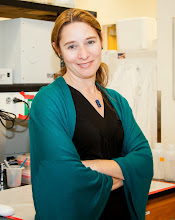Don’t just tell your audience-let them see (and hear, smell, and taste) the experience themselves! In a recent Toastmaster Magazine article, author Colleen Plimpton implored us as speakers to use rich sensory language in our presentations and to engage multiple sensory modalities by offering up things for our audience to see, smell, maybe even taste. Ms. Plimpton uses these techniques for her lectures on gardening and garden design, describing the vibrant flowers and musty soil of her trade.
 Right now you’re probably thinking, “easy for a gardener, but not a scientist.” Why not? Can’t an astrobiologist transport us to another planet, complete with its own sights, sounds and smells? Can’t a climate scientist describe the salty tang of the ocean while discussing ocean acidification? What about a talk on stream conservation, complete with a tactile description of the grit caused by bank erosion?
Right now you’re probably thinking, “easy for a gardener, but not a scientist.” Why not? Can’t an astrobiologist transport us to another planet, complete with its own sights, sounds and smells? Can’t a climate scientist describe the salty tang of the ocean while discussing ocean acidification? What about a talk on stream conservation, complete with a tactile description of the grit caused by bank erosion?In my own talks on hearing and deafness I invite the audience to listen, not just to my words, but to sounds. I tell them that as we age, our ability to hear high frequencies (high-pitched tones) fades. Then I play them a series of progressively higher frequency tones and let them hear for themselves! Eventually, they don’t hear for themselves, since only young kids (and my cats) can usually detect the highest frequencies I play.
This brief exercise lets my audience experience the importance of my topic first-hand by showing them that they’ve already suffered some degree of hearing loss. One particularly poignant presentation to a high school class demonstrates the power of this technique. I played a high frequency tone that made most of the class cringe and run for cover. One student, however, just sat there and looked confused. He quickly realized that standing next to 10-foot-high speakers at rock concerts had already caused irreparable harm to his hearing. My presentation, and specifically my technique for engaging multiple senses, helped this student to protect his remaining hearing. He now wears earplugs at concerts!
Whether your topic is hearing, climate change, or synthetic chemistry, I challenge you to work vivid sensory language and multi-sensory experiences into your future presentations. Change is in the air…I can smell it!

No comments:
Post a Comment